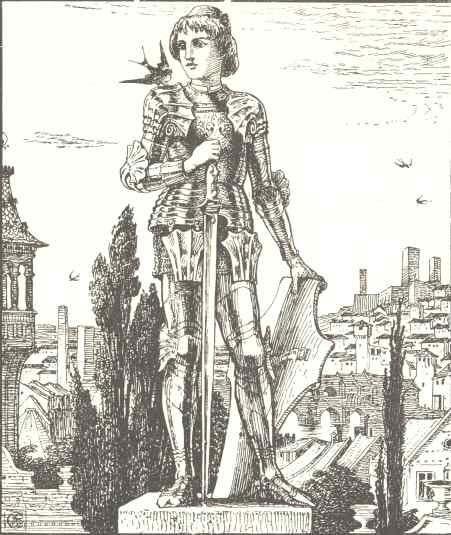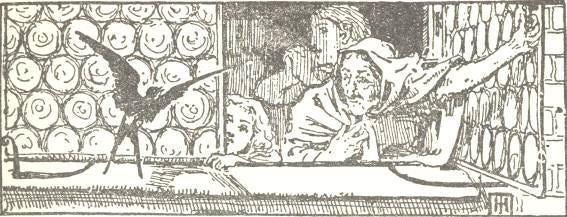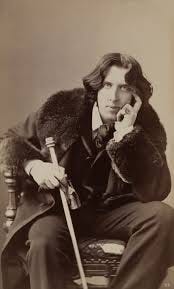A peek at Oscar Wilde's dark fables
Wilde's fairy tale 'The Happy Prince' blends his sparkling wit with an engaging story...
from Oscar Wilde, ‘The Happy Prince’
High above the city, on a tall column, stood the statue of the Happy Prince. He was gilded all over with thin leaves of fine gold, for eyes he had two bright sapphires, and a large red ruby glowed on his sword-hilt.

He was very much admired indeed. “He is as beautiful as a weathercock,” remarked one of the Town Councillors who wished to gain a reputation for having artistic tastes; “only not quite so useful,” he added, fearing lest people should think him unpractical, which he really was not.
“Why can’t you be like the Happy Prince?” asked a sensible mother of her little boy who was crying for the moon. “The Happy Prince never dreams of crying for anything.”
“I am glad there is some one in the world who is quite happy,” muttered a disappointed man as he gazed at the wonderful statue.
“He looks just like an angel,” said the Charity Children as they came out of the cathedral in their bright scarlet cloaks and their clean white pinafores.
“How do you know?” said the Mathematical Master, “you have never seen one.”
“Ah! but we have, in our dreams,” answered the children; and the Mathematical Master frowned and looked very severe, for he did not approve of children dreaming.
One night there flew over the city a little Swallow. His friends had gone away to Egypt six weeks before, but he had stayed behind, for he was in love with the most beautiful Reed. He had met her early in the spring as he was flying down the river after a big yellow moth, and had been so attracted by her slender waist that he had stopped to talk to her.
“Shall I love you?” said the Swallow, who liked to come to the point at once, and the Reed made him a low bow. So he flew round and round her, touching the water with his wings, and making silver ripples. This was his courtship, and it lasted all through the summer.
“It is a ridiculous attachment,” twittered the other Swallows; “she has no money, and far too many relations”; and indeed the river was quite full of Reeds. Then, when the autumn came they all flew away.
After they had gone he felt lonely, and began to tire of his lady-love. “She has no conversation,” he said, “and I am afraid that she is a coquette, for she is always flirting with the wind.” And certainly, whenever the wind blew, the Reed made the most graceful curtseys. “I admit that she is domestic,” he continued, “but I love travelling, and my wife, consequently, should love travelling also.”
“Will you come away with me?” he said finally to her; but the Reed shook her head, she was so attached to her home.
“You have been trifling with me,” he cried. “I am off to the Pyramids. Good-bye!” and he flew away.
All day long he flew, and at night-time he arrived at the city. “Where shall I put up?” he said; “I hope the town has made preparations.”
Then he saw the statue on the tall column.
“I will put up there,” he cried; “it is a fine position, with plenty of fresh air.” So he alighted just between the feet of the Happy Prince.
“I have a golden bedroom,” he said softly to himself as he looked round, and he prepared to go to sleep; but just as he was putting his head under his wing a large drop of water fell on him. “What a curious thing!” he cried; “there is not a single cloud in the sky, the stars are quite clear and bright, and yet it is raining. The climate in the north of Europe is really dreadful. The Reed used to like the rain, but that was merely her selfishness.”
Then another drop fell.
“What is the use of a statue if it cannot keep the rain off?” he said; “I must look for a good chimney-pot,” and he determined to fly away.
But before he had opened his wings, a third drop fell, and he looked up, and saw—Ah! what did he see?
The eyes of the Happy Prince were filled with tears, and tears were running down his golden cheeks. His face was so beautiful in the moonlight that the little Swallow was filled with pity.
“Who are you?” he said.
“I am the Happy Prince.”
“Why are you weeping then?” asked the Swallow; “you have quite drenched me.”
“When I was alive and had a human heart,” answered the statue, “I did not know what tears were, for I lived in the Palace of Sans-Souci, where sorrow is not allowed to enter. In the daytime I played with my companions in the garden, and in the evening I led the dance in the Great Hall. Round the garden ran a very lofty wall, but I never cared to ask what lay beyond it, everything about me was so beautiful. My courtiers called me the Happy Prince, and happy indeed I was, if pleasure be happiness. So I lived, and so I died. And now that I am dead they have set me up here so high that I can see all the ugliness and all the misery of my city, and though my heart is made of lead yet I cannot chose but weep.”
“What! is he not solid gold?” said the Swallow to himself. He was too polite to make any personal remarks out loud.
“Far away,” continued the statue in a low musical voice, “far away in a little street there is a poor house. One of the windows is open, and through it I can see a woman seated at a table. Her face is thin and worn, and she has coarse, red hands, all pricked by the needle, for she is a seamstress. She is embroidering passion-flowers on a satin gown for the loveliest of the Queen’s maids-of-honour to wear at the next Court-ball. In a bed in the corner of the room her little boy is lying ill. He has a fever, and is asking for oranges. His mother has nothing to give him but river water, so he is crying. Swallow, Swallow, little Swallow, will you not bring her the ruby out of my sword-hilt? My feet are fastened to this pedestal and I cannot move.”
“I am waited for in Egypt,” said the Swallow. “My friends are flying up and down the Nile, and talking to the large lotus-flowers. Soon they will go to sleep in the tomb of the great King. The King is there himself in his painted coffin. He is wrapped in yellow linen, and embalmed with spices. Round his neck is a chain of pale green jade, and his hands are like withered leaves.”
“Swallow, Swallow, little Swallow,” said the Prince, “will you not stay with me for one night, and be my messenger? The boy is so thirsty, and the mother so sad.”
“I don’t think I like boys,” answered the Swallow. “Last summer, when I was staying on the river, there were two rude boys, the miller’s sons, who were always throwing stones at me. They never hit me, of course; we swallows fly far too well for that, and besides, I come of a family famous for its agility; but still, it was a mark of disrespect.”
But the Happy Prince looked so sad that the little Swallow was sorry. “It is very cold here,” he said; “but I will stay with you for one night, and be your messenger.”
“Thank you, little Swallow,” said the Prince.
So the Swallow picked out the great ruby from the Prince’s sword, and flew away with it in his beak over the roofs of the town.
He passed by the cathedral tower, where the white marble angels were sculptured. He passed by the palace and heard the sound of dancing. A beautiful girl came out on the balcony with her lover. “How wonderful the stars are,” he said to her, “and how wonderful is the power of love!”
“I hope my dress will be ready in time for the State-ball,” she answered; “I have ordered passion-flowers to be embroidered on it; but the seamstresses are so lazy.”
He passed over the river, and saw the lanterns hanging to the masts of the ships…

What we love about this passage…
In these opening paragraphs, Wilde shows all the skill of a good storyteller, crafting a tale which is rich yet formulaic enough to hold the attention of young children, but also thought-provoking enough for adults. There seem to be a number of layers of meaning threaded together, and the clear sense that we are reading a parable may cause us to ask questions about the moral of the story. Why would a swallow fall in love with a reed, anyway? What is the relationship between the statue and the bird? Even though the story provokes these questions, Wilde delights in not declaring the answers.
Wilde very much enjoyed tempting readers to guess at the meaning of things, and he often played around with the belief that readers could simply decode a story in order to access to some important truth just below the surface. He would write in preface to his only novel The Picture of Dorian Gray (1891) that
‘The artist is the creator of beautiful things. To reveal art and conceal the artist is art’s aim […] Those who find ugly meanings in beautiful things are corrupt without being charming. This is a fault. Those who find beautiful meanings in beautiful things are the cultivated. For these there is hope. They are the elect to whom beautiful things mean only beauty.’
Wilde seems to be saying that to produce a simple answer about what writing is ‘really about’ always risks saying more about the reader than the writer. But isn’t that itself kind of a simple truth? In other words, did Wilde really believe this, or is this just another of his tricks — one where the author yet again seems to be saying one thing but really doing another?
About the Author
Oscar Wilde (1854-1900) was an Irish playwright, poet, novelist, editor, and essayist best known now for his farce The Importance of Being Earnest (1895). At the peak of his fame, he was arrested and tried for 'gross indecency' with men, homosexuality at that time being a criminal offence in England. After a highly publicized trial, Wilde was convicted and sentenced to two years' hard labour in prison. He conveyed the extreme harshness and suffering of his imprisonment in his poem 'The Ballad of Reading Gaol' (1898).
To read alongside…
How about our sister project Ten-Minute Book Club on Robert Henryson’s fable, The Cock and the Jasp, a much older work which seems to provoke the reader to decode a story but then withholds clear answers?
‘The Bee-Man’, by Alice Dunbar Nelson (then Alice Ruth Moore) is another nineteenth-century fairy tale that might be about tale-telling itself. Find it in the collection Violets, and Other Tales (1895) which we’ve featured before in our newsletters.
Or, one of our early newsletters featuring one of Wilde’s best-loved plays of the 1890s, A Woman of No Importance.
Suggest a LitHit!
Tell us your own favourites from literature you've read, and we can feature you as a Guest Curator if you like. Just email us with the following information:
Your full name
The title of the book you're suggesting
The location of the excerpt within the book (e.g., "in the middle of chapter 5"), or the excerpt itself copied into the email or attached to it (in Word)
Why you love it, in just a few sentences
About LitHits
LitHits helps you make time for reading by bringing you unabridged excerpts from brilliant literature that you can read on the go, anytime or any place. Our curators carefully select and frame each excerpt so that you can dive right in. We are more than a book recommendation site: we connect you with a powerful, enduring piece of literature, served directly to your mobile phone, tablet or computer.
You might also enjoy...
Feedback
We'd love to hear your thoughts on our newsletter:
kshepherdb@yahoo.co.uk
Graphic design by Sara Azmy
All curation content © 2024 LitHits. All rights reserved.




